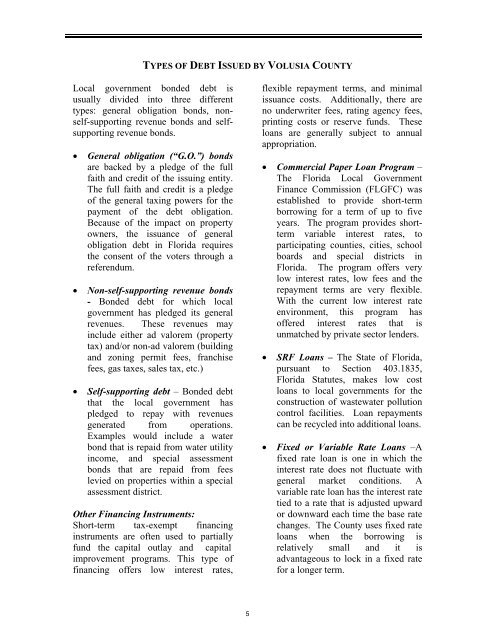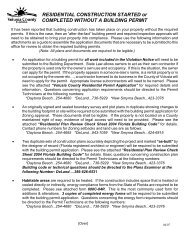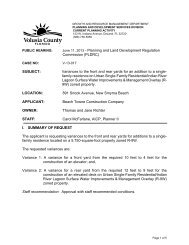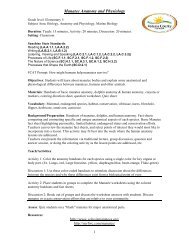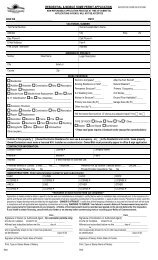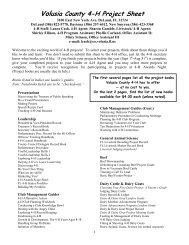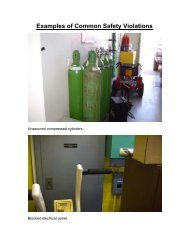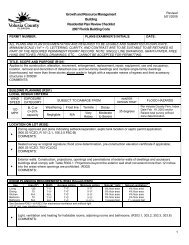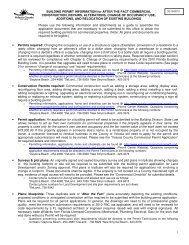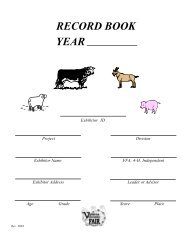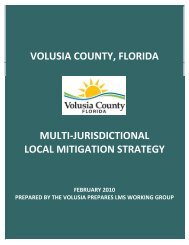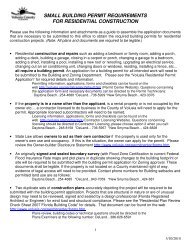2010 Debt Report - Volusia County Government
2010 Debt Report - Volusia County Government
2010 Debt Report - Volusia County Government
You also want an ePaper? Increase the reach of your titles
YUMPU automatically turns print PDFs into web optimized ePapers that Google loves.
TYPES OF DEBT ISSUED BY VOLUSIA COUNTY<br />
Local government bonded debt is<br />
usually divided into three different<br />
types: general obligation bonds, nonself-supporting<br />
revenue bonds and selfsupporting<br />
revenue bonds.<br />
• General obligation (“G.O.”) bonds<br />
are backed by a pledge of the full<br />
faith and credit of the issuing entity.<br />
The full faith and credit is a pledge<br />
of the general taxing powers for the<br />
payment of the debt obligation.<br />
Because of the impact on property<br />
owners, the issuance of general<br />
obligation debt in Florida requires<br />
the consent of the voters through a<br />
referendum.<br />
• Non-self-supporting revenue bonds<br />
- Bonded debt for which local<br />
government has pledged its general<br />
revenues. These revenues may<br />
include either ad valorem (property<br />
tax) and/or non-ad valorem (building<br />
and zoning permit fees, franchise<br />
fees, gas taxes, sales tax, etc.)<br />
• Self-supporting debt – Bonded debt<br />
that the local government has<br />
pledged to repay with revenues<br />
generated from operations.<br />
Examples would include a water<br />
bond that is repaid from water utility<br />
income, and special assessment<br />
bonds that are repaid from fees<br />
levied on properties within a special<br />
assessment district.<br />
Other Financing Instruments:<br />
Short-term tax-exempt financing<br />
instruments are often used to partially<br />
fund the capital outlay and capital<br />
improvement programs. This type of<br />
financing offers low interest rates,<br />
flexible repayment terms, and minimal<br />
issuance costs. Additionally, there are<br />
no underwriter fees, rating agency fees,<br />
printing costs or reserve funds. These<br />
loans are generally subject to annual<br />
appropriation.<br />
• Commercial Paper Loan Program –<br />
The Florida Local <strong>Government</strong><br />
Finance Commission (FLGFC) was<br />
established to provide short-term<br />
borrowing for a term of up to five<br />
years. The program provides shortterm<br />
variable interest rates, to<br />
participating counties, cities, school<br />
boards and special districts in<br />
Florida. The program offers very<br />
low interest rates, low fees and the<br />
repayment terms are very flexible.<br />
With the current low interest rate<br />
environment, this program has<br />
offered interest rates that is<br />
unmatched by private sector lenders.<br />
• SRF Loans – The State of Florida,<br />
pursuant to Section 403.1835,<br />
Florida Statutes, makes low cost<br />
loans to local governments for the<br />
construction of wastewater pollution<br />
control facilities. Loan repayments<br />
can be recycled into additional loans.<br />
• Fixed or Variable Rate Loans –A<br />
fixed rate loan is one in which the<br />
interest rate does not fluctuate with<br />
general market conditions. A<br />
variable rate loan has the interest rate<br />
tied to a rate that is adjusted upward<br />
or downward each time the base rate<br />
changes. The <strong>County</strong> uses fixed rate<br />
loans when the borrowing is<br />
relatively small and it is<br />
advantageous to lock in a fixed rate<br />
for a longer term.<br />
5


